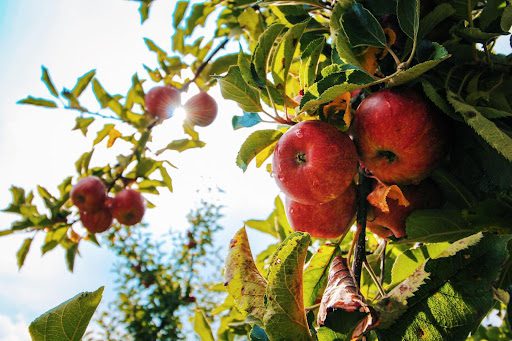Fruit trees are a dual-purpose crop, providing fruit for eating and canning as well as adding beauty to the landscape. With a little patience and proper care, fruit trees will provide abundant harvests for years to come. However, not all fruit trees are suitable for the Maine climate. Some fruit trees require a longer growing season than we have here in Maine, and others are not cold-hardy enough to withstand winters.
In this guide, we will discuss four fruit trees best suited for planting in Maine, as well as provide tips on care and maintenance. Keep reading to find out which fruit trees to plant on your property in Maine, as well as some important planting tips.
Hardiness Zones In Maine
The hardiness zone is the first thing to consider when choosing fruit trees for your property. Maine is located in USDA Hardiness Zones three through six. When selecting fruit trees, be sure to choose ones that are rated for at least two zones colder than ours. That way, you can be sure that your trees will survive our winters.
Four Best Fruit Trees For Maine
There are a few factors to consider when choosing fruit trees for your Maine property, such as cold-hardiness, disease resistance, and adaptability. Some fruit trees are more tolerant of harsh winters than others, while some are more resistant to common diseases and pests. And, of course, you’ll want to choose a tree that is well-suited to the growing conditions on your property.
With that in mind, here are some of the best fruit trees for Maine:
-
Apple Trees
If you’re looking for a fruit tree to add to your Maine garden, you can’t go wrong with apples. They are relatively disease-resistant and cold-hardy, meaning they can withstand colder temperatures. While apples require some care and attention, they are generally low-maintenance fruits that provide a bountiful harvest with proper care. There are many different types of apple trees available, and most of them will do well in Maine.
Some of the best apple varieties for Maine include:
Cortland – Cortland apples are a cross between McIntosh and Ben Davis apples. They are large, round apples with a red and green coloration. They have a crisp, juicy flesh that is perfect for eating fresh or for use in pies and other baked goods. Cortland apples are available from late September through early November.
Macoun – The Macoun apple is a relatively new variety, first developed in Canada in the early 20th century. It is a cross between the McIntosh and Ben Davis apples, two of the most popular varieties grown at the time. The Macoun apple is small to medium-sized, with a dark red coloration. The flesh is firm and crisp, with a sweet-tart flavor. The apple is extremely popular in Canada and the northeastern United States, where it is often used for baking or eaten fresh
Northern Spy – Northern Spy apples are a popular variety of apple that is known for their tart flavor and crisp texture. The skin of a Northern Spy apple is greenish-yellow, and the flesh is white or pale yellow. Northern Spy apples are typically harvested in October and can be stored for several months. This type of apple is a good choice for baking, as it holds its shape well and has a pleasant balance of sweetness and acidity.
-
Plum Trees
Plums are a type of fruit that belongs to the subgenus Prunus. They are native to Europe, Asia, and the Americas. More than 2,000 varieties of plums are grown worldwide. Plum trees are small to medium-sized trees that grow to a height of 20-25 feet. Growing plum trees in Maine can be a great way to add fresh fruit to your diet while also beautifying your landscape.
Plums are relatively easy to care for and can thrive in various soil types. Additionally, plum trees are relatively disease-resistant, making them a low-maintenance option for busy gardeners. Best of all, plums are a rewarding fruit to harvest, with each tree yielding up to 60 pounds of fruit per season.
Plums also contain phytonutrients that have been shown to have anti-inflammatory, anti-cancer, and anti-diabetic effects. Because of these health benefits, plum trees are an excellent choice for those looking to add a fruit tree to their Maine home garden.
Pear Trees
While many different types of fruit trees can be grown in Maine, pear trees are particularly well-suited to the climate and soil conditions. Pears grow best in regions with cool, moist summers and mild winters, and they require well-drained soil with moderate fertility. Maine meets all of these requirements, making it an ideal location for growing pear trees. In addition, pear trees are relatively pest- and disease-resistant, which is an important consideration in any fruit-growing region.
However, choose your pear variety carefully, especially where zone hardiness is concerned. In general, Asian varieties are not as cold-hardy as European varieties and are more likely to be damaged by late frosts. For this reason, it’s a good idea to choose a variety that is known to do well in Maine, such as Harrow Delight, Maxine, Golden Spice & Seckel.
Peach Trees
Peaches are a classic summer fruit, and there’s nothing quite like biting into a ripe, juicy peach on a hot day. Whether you enjoy them plain or topped with ice cream, peaches are a tasty treat that can be enjoyed in many different ways. While you can certainly find peaches at your local grocery store, there’s nothing quite like picking them fresh from the tree. And if you live in Maine, you’re in luck, as peach trees are well-suited to the climate and soil conditions.
Even though they aren’t the most winter-hardy fruit trees, peach trees can typically withstand temperatures as low as 10 degrees Fahrenheit. However, they will need to be protected from frost during the blooming season, as frost can damage the flowers and fruit. When planting peach trees in Maine, it’s important to choose a variety that is specifically bred for cold climates, such as the ‘Red Haven’ or ‘Reliance’ varieties.
Peach trees favor elevated, well-drained sites with full sun exposure. They are relatively drought-tolerant once established, but young trees will need to be watered regularly during the first few years. When planting peach trees in Maine, be sure to space them at least 15 feet apart to allow for proper air circulation and prevent disease.
With proper care, peach trees can produce fruit for many years. A healthy tree can live for over 50 years and produce hundreds of pounds of fruit each season.
How To Plant Fruit Trees
Now that you know what fruit trees are best suited for growing in Maine, it’s time to learn how to plant them. While the process of planting fruit trees is relatively straightforward, there are a few things you should keep in mind to ensure success.
-
- First, it’s important to choose the right location for your fruit tree. As mentioned previously, fruit trees need full sun exposure and well-drained soil. They also benefit from being protected from strong winds, so avoid planting them near open fields or along exposed ridges. Once you’ve selected a suitable location, dig a hole that is twice as wide as the root ball and just deep enough to allow the roots to be fully covered.
- Next, remove the tree from its container and loosen any compacted roots. This will help the tree to establish itself more quickly in its new location. Once the roots have been loosened, place the tree in the hole and backfill with soil.
- Once you’ve planted your fruit tree, it’s important to give it the proper care to ensure a bountiful harvest. Mulching is one of the best things you can do for your tree, as it helps to conserve moisture and keep the roots cool in summer. Apply a layer of mulch around the base of the tree, being sure to leave a few inches of space between the trunk and mulch.
- During the first year after planting, water your tree deeply once per week. Once established, most fruit trees will only need to be watered during prolonged periods of drought. Over-watering can be harmful to fruit trees, so be sure not to overdo it.
- Fertilizing fruit trees is generally not necessary, but if you feel your tree is not growing as vigorously as it should, you can apply a slow-release fertilizer in early spring.
Our Final Thoughts
Now that you know what fruit trees are best suited for planting in Maine, as well as how to plant and care for them, you’re ready to start growing your own. With a little patience and effort, you’ll soon be enjoying fresh fruit straight from your backyard.
Looking to incorporate fruit trees and up your property value? Call Stone Solutions Maine to get started. Our outdoor landscaping services include patio installation, outdoor fireplace installation, gardening landscaping, and much more. Contact us today to learn more about our services!

